Index
Dr. Sebastian Kuckuk
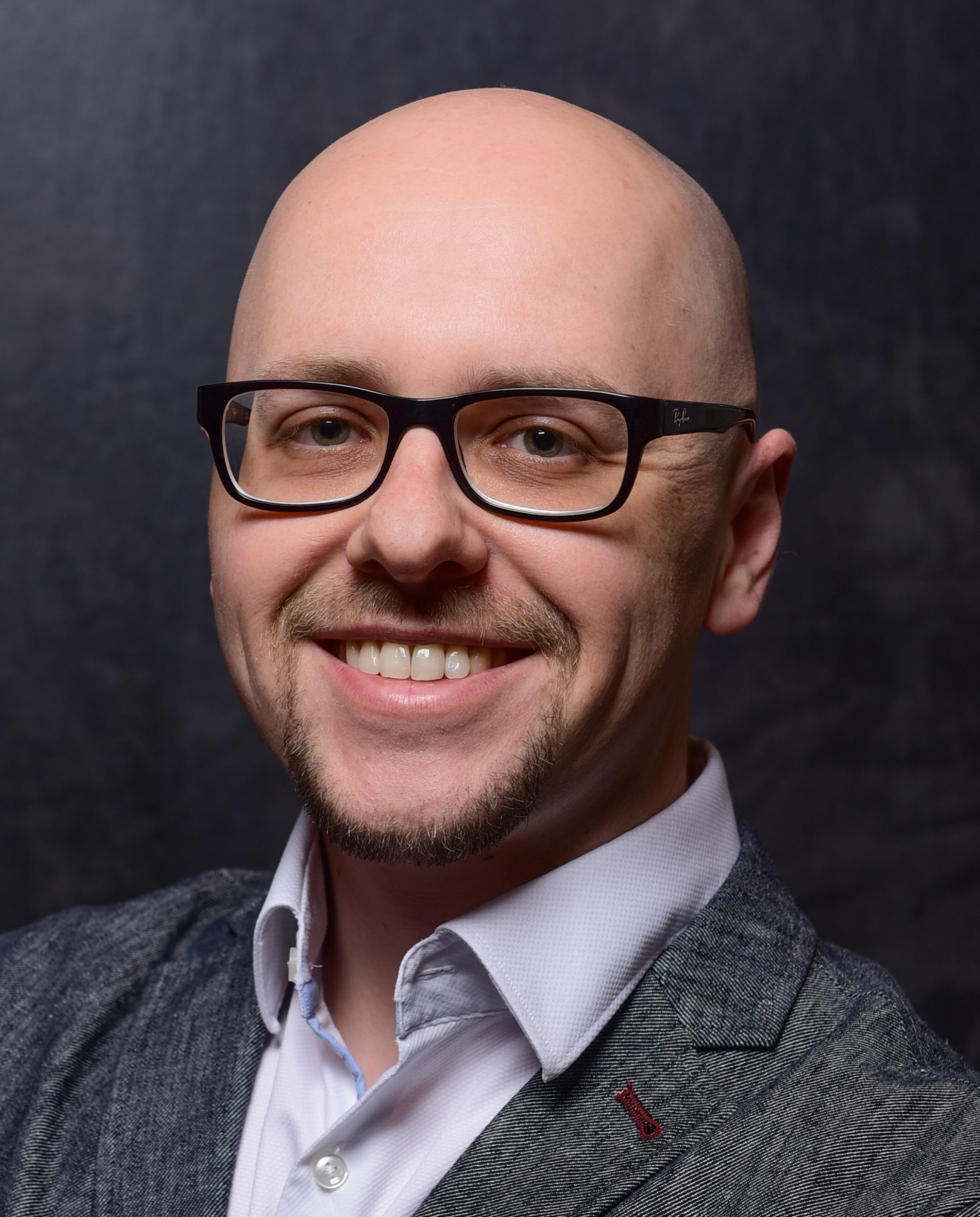
Sebastian holds a PhD in computer science from FAU, where he currently works as a researcher. His primary interests revolve around enhancing performance portability and programmer productivity through the use of domain-specific programming languages, code generation techniques, automatic parallelization, and GPU programming. He applies these methodologies in the context of massively parallel numerical solvers for computational fluid applications and other related fields.
In 2021, Sebastian joined NHR@FAU as a liaison scientist for the Chair of System Simulation. He simultaneously became a member of the Training and Support division, which he joined as a full member in spring of 2024. In addition, he serves as an NVIDIA Deep Learning Institute (DLI) university ambassador and is certified to teach DLI courses covering both introductory and advanced concepts in GPU programming. Sebastian contributes his expertise by engaging in smaller project-driven consultation activities, conducting lecture exercises, and delivering single- and multi-day tutorials.
During his free time, Sebastian finds pleasure in cooking and biking. He also pursues his interests in learning the Japanese language and exploring topics in psychology and philosophy.
Sebastian provides support and consulting for KONWIHR and NHR projects revolving around GPU programming, performance analysis and optimization.
Sebastian completed multiple courses offered by the NVIDIA Deep Learning Institute (DLI) on GPU programming and CUDA-accelerated applications that scale across multiple GPUs. He attained certification as DLI ambassador and was certified to teach the following courses:
- Fundamentals of Accelerated Computing with CUDA C/C++
- Fundamentals of Accelerated Computing with CUDA Python
- Accelerating CUDA C++ Applications with Multiple GPUs
- Scaling CUDA C++ Applications to Multiple Nodes
A list of upcoming and past courses can be found here.
Sebastian contributes his expertise to the following lectures:
- High-End Simulation in Practice (HESP)
- Programming Techniques for Supercomputers (PTfS)
Sebastian is a maintainer and developer of
- the ExaStencils code generation framework for massively parallel multigrid solvers, and
- the GHODDESS module for quadrature free higher-order discretizations of the shallow water equations.
Further information can be found on the official page https://www.exastencils.fau.de/ .
2025
- , , , , :
p-adaptive discontinuous Galerkin method for the shallow water equations on heterogeneous computing architectures
In: GEM - International Journal on Geomathematics 16 (2025), Article No.: 8
ISSN: 1869-2672
DOI: 10.1007/s13137-025-00267-2
2024
- , , :
Code Generation for Octree-Based Multigrid Solvers with Fused Higher-Order Interpolation and Communication
Euro-Par 2024 (Madrid, 2024-08-26 - 2024-08-30)
DOI: 10.1007/978-3-031-69583-4_17
2023
- , , :
Generating Coupling Interfaces for Multiphysics Simulations with ExaStencils and waLBerla
International Parallel and Distributed Processing Symposium (IPDPS) (St. Petersburg, Florida USA, 2023-05-15 - 2023-05-19)
In: 2023 IEEE International Parallel and Distributed Processing Symposium Workshops (IPDPSW), Los Alamitos, CA, USA: 2023
DOI: 10.1109/IPDPSW59300.2023.00112
URL: https://ieeexplore.ieee.org/document/10196550 - , , , , , :
Discontinuous Galerkin method for the shallow water equations on complex domains using masked block-structured grids
In: Advances in Water Resources 182 (2023), Article No.: 104584
ISSN: 0309-1708
DOI: 10.1016/j.advwatres.2023.104584
2022
- , , :
Fusion of Massively-Parallel Simulation Frameworks and Code Generation Methodologies for Lattice Boltzmann and Multigrid Applications
Platform for Advanced Scientific Computing (PASC) Conference (Congress Center Basel, Switzerland., 2022-06-27 - 2022-06-29)
URL: https://pasc22.pasc-conference.org/fileadmin/user_upload/pasc22/pdf/P41_pos144s2-file1.pdf - , , , , , :
Automatic Generation of Load-Balancing-Aware Block-Structured Grids for Complex Ocean Domains.
2022 SIAM International Meshing Roundtable
In: Robinson, Trevor ; Moxey, David ; Tomov, Vladimir Z. (ed.) (ed.): Proceedings of the 2022 SIAM International Meshing Roundtable 2022
DOI: 10.5281/zenodo.6562440
2021
- , , :
EvoStencils: a grammar-based genetic programming approach for constructing efficient geometric multigrid methods
In: Genetic Programming and Evolvable Machines (2021)
ISSN: 1389-2576
DOI: 10.1007/s10710-021-09412-w
URL: http://link.springer.com/article/10.1007/s10710-021-09412-w
2020
- , , , , , :
Quadrature-free discontinuous Galerkin method with code generation features for shallow water equations on automatically generated block-structured meshes
In: Advances in Water Resources 138 (2020), Article No.: 103552
ISSN: 0309-1708
DOI: 10.1016/j.advwatres.2020.103552 - , , , , , :
Code generation approaches for parallel geometric multigrid solvers
In: Analele Stiintifice ale Universitatii Ovidius Constanta, Seria Matematica 28 (2020), p. 123-152
ISSN: 1844-0835
DOI: 10.2478/auom-2020-0038 - , , , , , , , , , , , , , , , , :
ExaStencils: Advanced multigrid solver generation
In: Hans-Joachim Bungartz, Severin Reiz, Benjamin Uekermann, Philipp Neumann, Wolfgang E. Nagel (ed.): Lecture notes in computational science and engineering, Cham: Springer, 2020, p. 405-452 (Software for Exascale Computing SPPEXA 2016 – 2019, Vol.136)
ISBN: 978-3-030-47955-8
DOI: 10.1007/978-3-030-47956-5
URL: https://library.oapen.org/bitstream/handle/20.500.12657/41289/2020_Book_SoftwareForExascaleComputing-S.pdf?sequence=1#page=411 - , , , , , , , , , , , , , , , , :
ExaStencils – Advanced Multigrid Solver Generation
In: Hans-Joachim Bungartz, Severin Reiz, Philipp Neumann, Benjamin Uekermann, Wolfgang Nagel (ed.): Software for Exascale Computing – SPPEXA 2016-2019, Springer, 2020, p. 405-452 (Lecture Notes in Computer Science and Engineering, Vol.136)
ISBN: 978-3-030-47955-8
DOI: 10.1007/978-3-030-47956-5_14
URL: https://www12.cs.fau.de/downloads/hannig/publications/ExaStencils_Advanced_Multigrid_Solver_Generation.pdf - , , :
Constructing Efficient Multigrid Solvers with Genetic Programming
Genetic and Evolutionary Computation Conference (GECCO '20) (Cancún, 2020-07-08 - 2020-07-12)
In: Association for Computing Machinery (ed.): Proceedings of the 2020 Genetic and Evolutionary Computation Conference, New York, NY, USA: 2020
DOI: 10.1145/3377930.3389811
2019
- :
Automatic Code Generation for Massively Parallel Applications in Computational Fluid Dynamics (Dissertation, 2019)
URL: https://opus4.kobv.de/opus4-fau/frontdoor/index/index/docId/13050 - , , :
Towards the automatic optimization of geometric multigrid methods with evolutionary computation
19th Copper Mountain Conference On Multigrid Methods (Copper Mountain, Colorado, 2019-03-24 - 2019-03-28)
DOI: 10.29007/1c29
URL: https://easychair.org/smart-slide/slide/7g69
2018
- , :
Code Generation for Massively Parallel PDE Solvers
Computational Science at Scale (CoSaS) (Erlangen, 2018-09-05 - 2018-09-07) - , :
Generation of Highly Parallel Multigrid Solvers for CFD Applications
SIAM Conference on Parallel Processing for Scientific Computing 2018 (Tokio, 2018-03-07 - 2018-03-10) - , :
Towards Whole Program Generation for Ocean Modeling
PASC'18 (Basel, 2018-07-02 - 2018-07-04) - , :
Whole Program Generation of Massively Parallel Shallow Water Equation Solvers
2018 IEEE International Conference on Cluster Computing (CLUSTER) (Belfast, 2018-09-10 - 2018-09-13)
In: 2018 IEEE International Conference on Cluster Computing (CLUSTER) 2018
DOI: 10.1109/CLUSTER.2018.00020
URL: https://ieeexplore.ieee.org/document/8514861 - , , , , , :
Reconfigurable Hardware Generation of Multigrid Solvers with Conjugate Gradient Coarse-Grid Solution
In: Parallel Processing Letters 28 (2018), Article No.: 1850016
ISSN: 0129-6264
DOI: 10.1142/S0129626418500160
2017
- , , , :
Towards Generating Efficient Flow Solvers with the ExaStencils Approach
In: Concurrency and Computation-Practice & Experience 29 (2017), p. 4062:1-4062:17
ISSN: 1532-0626
DOI: 10.1002/cpe.4062
URL: https://onlinelibrary.wiley.com/doi/abs/10.1002/cpe.4062 - , :
Metaprogramming for Unstructured Mesh Applications in Ocean Modeling
SIAM Conference on Computational Science and Engineering 2017 (Atlanta, 2017-02-27 - 2017-03-03) - , :
Whole Program Generation for Complex Fluid Flow Solvers
PASC'17 (Lugano, 2017-06-26 - 2017-02-28) - , , , , , :
Towards Virtual Hardware Prototyping for Generated Geometric Multigrid Solvers
CS 2017-01 (2017), p. 1-8
ISSN: 2191-5008
Open Access: http://nbn-resolving.de/urn:nbn:de:bvb:29-opus4-83179
URL: http://nbn-resolving.de/urn:nbn:de:bvb:29-opus4-83179
(Techreport) - , , , , , , , :
A Scala Prototype to Generate Multigrid Solver Implementations for Different Problems and Target Multi-Core Platforms
In: International Journal of Computational Science and Engineering 14 (2017), p. 150-163
ISSN: 1742-7185
DOI: 10.1504/IJCSE.2017.10003829
2016
- , , :
Redundancy Elimination in the ExaStencils Code Generator
First International Workshop on Data Locality in Modern Computing Systems (DLMCS 2016) (Granada, Spain, 2016-12-14 - 2016-12-16)
In: Proceedings of the First International Workshop on Data Locality in Modern Computing Systems (DLMCS), Berlin, Heidelberg, New York: 2016
DOI: 10.1007/978-3-319-49956-7_13 - :
Challenges in Fully Generating Multigrid Solvers for the Simulation of non-Newtonian Fluids
HiStencils 2016 (Prag, 2016-01-18 - 2016-01-18) - , :
Automatic Code Generation for Simulating Non-Newtonian Fluid Flows with ExaStencils
SIAM Conference on Parallel Processing 2016 (Paris, 2016-04-12 - 2016-04-15) - , :
Automatic Code Generation for Simulations of Non-Newtonian Fluids
PASC'16 (Lausanne, 2016-06-08 - 2016-06-10) - , :
Automatic Generation of Massively Parallel Codes from ExaSlang
In: Computation 4 (2016), p. 1-20
ISSN: 2079-3197
Open Access: http://www.mdpi.com/2079-3197/4/3/27
URL: http://www.mdpi.com/2079-3197/4/3/27/pdf - , , , , , , :
Systems of Partial Differential Equations in ExaSlang
In: Software for Exascale Computing - SPPEXA 2013-2015, Berlin, Heidelberg, New York: Springer, 2016, p. 47-67 (Lecture Notes in Computational Science and Engineering, Vol.113)
ISBN: 9783319405261
DOI: 10.1007/978-3-319-40528-5_3
2015
- , , :
ExaSlang and the ExaStencils Code Generator
PASC'15 (Zürich, 2015-06-01 - 2015-06-03) - , , , , , :
Generation of Multigrid-based Numerical Solvers for FPGA Accelerators
2nd International Workshop on High-Performance Stencil Computations (HiStencils) (Amsterdam, 2015-01-20 - 2015-01-20)
In: Proceedings of the 2nd International Workshop on High-Performance Stencil Computations (HiStencils) 2015
URL: https://www12.cs.fau.de/downloads/schmittch/publications/SSHTKK15histencils.pdf
2014
- , , , , , , , :
Experiments on Optimizing the Performance of Stencil Codes with SPL Conqueror
In: Parallel Processing Letters 24 (2014)
ISSN: 0129-6264
DOI: 10.1142/S0129626414410011 - , , , , :
Optimizing the Performance of Customizable Stencil Codes with Feature-Interaction Detection - , , , , , :
Optimizing Performance of Stencil Code with SPL Conqueror
1st International Workshop on High-Performance Stencil Computations (HiStencils) (Vienna, 2014-01-20 - 2014-01-20)
In: Proceedings of the 1st International Workshop on High-Performance Stencil Computations (HiStencils) 2014
URL: https://www12.cs.fau.de/downloads/schmittch/publications/GSAKSK14histencils.pdf - :
Generating Data Structures and Communication for Highly Parallel Geometric Multigrid Solvers
SPPEXA Doktorandenkolloquium (Erlangen, 2014-07-02 - 2014-07-02) - , , , :
A Generic Prototype to Benchmark Algorithms and Data Structures
In: Parallel Computing: Accelerating Computational Science and Engineering (CSE), Berlin: IOS Press, 2014, p. 813-822 (Advances in Parallel Computing, Vol.25)
ISBN: 978-1-61499-380-3
DOI: 10.3233/978-1-61499-381-0-813
URL: http://ebooks.iospress.nl/volumearticle/35957 - , , , , :
Generating Highly Parallel Geometric Multigrid Solvers with the ExaStencils Apporach
3rd Workshop on Extreme-scale Programming Tools (New Orleans, 2014-11-17 - 2014-11-17) - , :
Automatic Generation of Algorithms and Data Structures for Geometric Multigrid
SIAM Conference on Parallel Processing for Scientific Computing (Portland, 2014-02-18 - 2014-02-21) - , , , , , , , , , , , , :
ExaStencils: Advanced Stencil-Code Engineering - First Project Report
(2014)
Open Access: http://www.fim.uni-passau.de/fileadmin/files/forschung/mip-berichte/MIP1401.pdf
(Techreport) - , , , , , , , , , , , , :
ExaStencils: Advanced Stencil-Code Engineering
Euro-Par: Parallel Processing Workshops (Porto, 2014-08-25 - 2014-08-26)
In: Proceedings of Euro-Par 2014: Parallel Processing Workshops, Berlin; Heidelberg: 2014
DOI: 10.1007/978-3-319-14313-2_47
URL: http://link.springer.com/content/pdf/10.1007/978-3-319-14313-2_47.pdf - , , , , :
ExaSlang: A Domain-Specific Language for Highly Scalable Multigrid Solvers
4th International Workshop on Domain-Specific Languages and High-Level Frameworks for High Performance Computing (WOLFHPC) (New Orleans, LA, USA, 2014-11-17 - 2014-11-17)
In: Proc. of the 4th International Workshop on Domain-Specific Languages and High-Level Frameworks for High Performance Computing (WOLFHPC), New York, NY, USA: 2014
DOI: 10.1109/WOLFHPC.2014.11 - , , , , :
An Evaluation of Domain-Specific Language Technologies for Code Generation
14th International Conference on Computational Science and its Applications (ICCSA) (Minho, Guimaraes, 2014-06-30 - 2014-07-03)
In: Proc. of the 14th International Conference on Computational Science and its Applications (ICCSA), New York, NY, USA: 2014
DOI: 10.1109/ICCSA.2014.16
2013
- , :
A Framework for Interactive Physical Simulations on Remote HPC Clusters
CS-2013-06 (2013), p. 1-10
ISSN: 2191-5008
Open Access: https://opus4.kobv.de/opus4-fau/frontdoor/index/index/docId/5024
URL: http://opus4.kobv.de/opus4-fau/files/5024/Kuckuk_2013_VIPER.pdf
(Techreport) - , , :
Interactive particle dynamics using OpenCL and Kinect
In: International Journal of Parallel, Emergent and Distributed Systems 28 (2013), p. 518-536
ISSN: 1744-5760
DOI: 10.1080/17445760.2012.745671
URL: http://www.tandfonline.com/doi/pdf/10.1080/17445760.2012.745671
Automatic Code Generation for Massively Parallel Applications in Computational Fluid Dynamics
An open access version of the thesis is available here (PDF).
Abstract
Solving partial differential equations (PDEs) is a fundamental challenge in many application domains in industry and academia alike. With increasingly large problems, efficient and highly scalable implementations become more and more crucial. Today, facing this challenge is more difficult than ever due to the increasingly heterogeneous hardware landscape. One promising approach is developing domain‐specific languages (DSLs) for a set of applications. Using code generation techniques then allows targeting a range of hardware platforms while concurrently applying domain‐specific optimizations in an automated fashion. The present work aims to further the state of the art in this field. As domain, we choose PDE solvers and, in particular, those from the group of geometric multigrid methods. To avoid having a focus too broad, we restrict ourselves to methods working on structured and patch‐structured grids.
We face the challenge of handling a domain as complex as ours, while providing different abstractions for diverse user groups, by splitting our external DSL ExaSlang into multiple layers, each specifying different aspects of the final application. Layer 1 is designed to resemble LaTeX and allows inputting continuous equations and functions. Their discretization is expressed on layer 2. It is complemented by algorithmic components which can be implemented in a Matlab‐like syntax on layer 3. All information provided to this point is summarized on layer 4, enriched with particulars about data structures and the employed parallelization. Additionally, we support automated progression between the different layers. All ExaSlang input is processed by our jointly developed Scala code generation framework to ultimately emit C++ code. We particularly focus on how to generate applications parallelized with, e.g., MPI and OpenMP that are able to run on workstations and large‐scale cluster alike.
We showcase the applicability of our approach by implementing simple test problems, like Poisson’s equation, as well as relevant applications from the field of computational fluid dynamics (CFD). In particular, we implement scalable solvers for the Stokes, Navier‐Stokes and shallow water equations (SWE) discretized using finite differences (FD) and finite volumes (FV). For the case of Navier‐Stokes, we also extend our implementation towards non‐uniform grids, thereby enabling static mesh refinement, and advanced effects such as the simulated fluid being non‐Newtonian and non‐isothermal.
Jan Laukemann
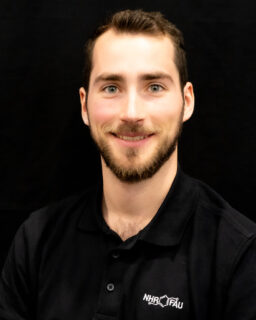
Short bio
Jan Laukemann is a PhD student at the University of Erlangen-Nürnberg (FAU) Erlangen and works for the National High Performance Computing Center (NHR@FAU). Previously he finished his Master’s at FAU and worked as a Research Scientist at Intel Parallel Computing Labs (Intel PCL). He focuses on application optimization and performance engineering for HPC systems and novel algorithms for scalable linear algebra, tensor decomposition and graph computations. His research interests primarily include x86 and non-x86 computer architectures, their performance behavior on the node level, and vectorization techniques. He is the main developer of the Open Source Architecture Code Analyzer (OSACA), a static in-core kernel analysis tool, and is part of the organization committee of the annual HPC-AI Advisory Council Student Cluster Competition at ISC High Performance.
Research fields
List of publications
2025
- , , , , , , , , , :
Accelerating Sparse Tensor Decomposition Using Adaptive Linearized Representation
In: IEEE Transactions on Parallel and Distributed Systems (2025)
ISSN: 1045-9219
DOI: 10.1109/TPDS.2025.3553092
2024
- , , , , :
CloverLeaf on Intel Multi-Core CPUs: A Case Study in Write-Allocate Evasion
38th IEEE International Parallel and Distributed Processing Symposium, IPDPS 2024 (San Francisco, CA, 2024-05-27 - 2024-05-31)
In: 2024 IEEE International Parallel and Distributed Processing Symposium (IPDPS) 2024
DOI: 10.1109/IPDPS57955.2024.00038 - , , :
Microarchitectural comparison and in-core modeling of state-of-the-art CPUs: Grace, Sapphire Rapids, and Genoa
SC24-W: Workshops of the International Conference for High Performance Computing, Networking, Storage and Analysis (Atlanta, 2024-11-17 - 2024-11-22)
In: SC24-W: Workshops of the International Conference for High Performance Computing, Networking, Storage and Analysis, New York City: 2024
DOI: 10.1109/SCW63240.2024.00181
2023
- , :
Core-Level Performance Engineering with the Open-Source Architecture Code Analyzer (OSACA) and the Compiler Explorer
14th Annual ACM/SPEC International Conference on Performance Engineering, ICPE 2023 (Coimbra, 2023-04-15 - 2023-04-19)
In: ICPE 2023 - Companion of the 2023 ACM/SPEC International Conference on Performance Engineering 2023
DOI: 10.1145/3578245.3583716 - , , , , , :
MD-Bench: A performance-focused prototyping harness for state-of-the-art short-range molecular dynamics algorithms
In: Future Generation Computer Systems-The International Journal of Grid Computing Theory Methods and Applications 149 (2023), p. 25-38
ISSN: 0167-739X
DOI: 10.1016/j.future.2023.06.023 - , , , , , :
MD-Bench: A performance-focused prototyping harness for state-of-the-art short-range molecular dynamics algorithms
In: Future Generation Computer Systems-The International Journal of Grid Computing Theory Methods and Applications (2023)
ISSN: 0167-739X
DOI: 10.1016/j.future.2023.06.023 - , , , , , , , :
Dynamic Tensor Linearization and Time Slicing for Efficient Factorization of Infinite Data Streams
International Symposium on Parallel and Distributed Processing (IPDPS) (St. Petersburg, FL, 2023-05-15 - 2023-05-19)
In: 2023 IEEE International Parallel and Distributed Processing Symposium (IPDPS) 2023
DOI: 10.1109/IPDPS54959.2023.00048
2022
- , , , , , , , , :
Efficient, out-of-memory sparse MTTKRP on massively parallel architectures
36th ACM International Conference on Supercomputing, ICS 2022 (Online, 2022-06-27 - 2022-06-30)
In: Proceedings of the International Conference on Supercomputing 2022
DOI: 10.1145/3524059.3532363
2021
- , , , , , , :
Execution-Cache-Memory modeling and performance tuning of sparse matrix-vector multiplication and Lattice quantum chromodynamics on A64FX
In: Concurrency and Computation-Practice & Experience (2021)
ISSN: 1532-0626
DOI: 10.1002/cpe.6512
URL: https://onlinelibrary.wiley.com/doi/full/10.1002/cpe.6512 - , , , , , , :
ALTO: Adaptive Linearized Storage of Sparse Tensors
ICS '21: 2021 International Conference on Supercomputing (Virtual Event, USA, 2021-06-14 - 2021-06-17)
DOI: 10.1145/3447818.3461703
URL: https://dl.acm.org/doi/10.1145/3447818.3461703
2020
- , , , , , , :
Performance Modeling of Streaming Kernels and Sparse Matrix-Vector Multiplication on A64FX
2020 IEEE/ACM Performance Modeling, Benchmarking and Simulation of High Performance Computer Systems, PMBS 2020 (, 2020-11-12)
In: Proceedings of PMBS 2020: Performance Modeling, Benchmarking and Simulation of High Performance Computer Systems 2020
DOI: 10.1109/PMBS51919.2020.00006
2019
- , , , :
Automatic Throughput and Critical Path Analysis of x86 and ARM Assembly Kernels
10th IEEE/ACM Performance Modeling, Benchmarking and Simulation of High Performance Computer Systems, PMBS 2019
DOI: 10.1109/PMBS49563.2019.00006 - , , , , :
Automated instruction stream throughput prediction for intel and AMD microarchitectures
2018 IEEE/ACM Performance Modeling, Benchmarking and Simulation of High Performance Computer Systems, PMBS 2018 (Dallas, TX, 2018-11-12)
In: Proceedings of PMBS 2018: Performance Modeling, Benchmarking and Simulation of High Performance Computer Systems, Held in conjunction with SC 2018: The International Conference for High Performance Computing, Networking, Storage and Analysis 2019
DOI: 10.1109/PMBS.2018.8641578
List of activities
2023
- OSACA – A Multi-Platform Static Code Analyzer for In-core Performance Prediction
(Speech / Talk)
2023-06-19, Event: 2023 Scalable Tools Workshop, Rice University, URL: https://dyninst.github.io/scalable_tools_workshop/petascale2023/monday.html
2021
- OOKAMI A64FX Webinar: LIKWID, OSACA, SpMV
(Speech / Talk)
2021-07-27, Event: OOKAMI Hackathon, URL: https://moodle.nhr.fau.de/course/view.php?id=8
Dr. Alireza Ghasemi
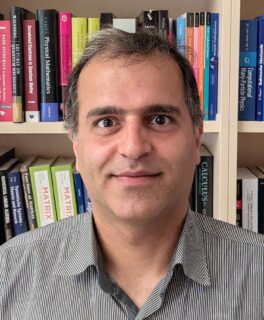
Alireza was born in Iran, where he also completed his undergraduate studies in physics. In 2008, he received his PhD in computational physics from Basel University in Switzerland. After that, he continued his research in atomic-scale material modeling in different roles. In 2019, he moved to Paderborn and subsequently worked as an Alexander Von Humboldt Senior Fellow. On February 1, Alireza Ghasemi joined the NHR@FAU Training and Support division. He will support our customers as an expert for atomistic simulations and quantum chemistry. He has contributed to several software packages in this area and is familiar with high performance computing both as a user and as an administrator.
Sebastian Wind
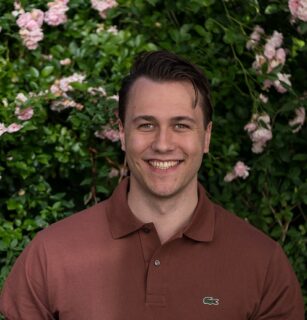
Sebastian is a PhD candidate and technology professional with a profound background in enterprise computing and AI research. Before joining NHR, he specialized in IBM Systems during his time at Datev and collaborated with the Pattern Recognition Lab on large language model (LLM) initiatives. Currently, Sebastian provides NHR training and support for HPC AI users, leveraging his AI training expertise and driving innovation in high-performance computing.
Rasa Mabande
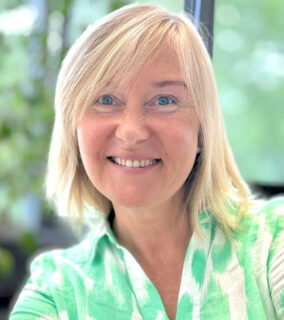
Rafael Ravedutti Lucio Machado
Aditya Ujeniya
Jairo Andres Buitrago Franco
Michael Panzlaff
Martin Mayr
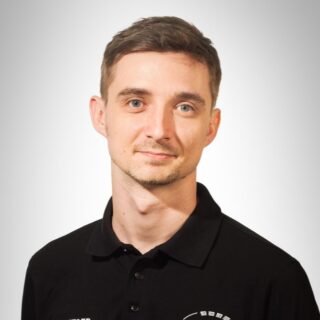
From August 2019 and October 2024, Martin was a doctoral researcher in the Computer Vision group at the Pattern Recognition Lab (PRL) of Friedrich-Alexander-Universität Erlangen-Nürnberg (FAU). During this time, he developed innovative approaches for image segmentation, retrieval, generation, text recognition, and metadata extraction, contributing to multiple research projects. His work also included advanced retrieval models for document analysis and pioneering methods for text generation, imitation (Best Student Paper Award at ICDAR 2021), and recognition (Best Poster Award at ICDAR 2023). For a complete overview of his research, find the publications listed below.
In January 2025, Martin moved to NHR Erlangen, where he specializes in AI-focused high-performance computing solutions, providing training, custom workflows, and user support to researchers across diverse scientific disciplines.
- 01/2025 – current:
Training & User Support AI at NHR Erlangen - 08/2019 – 10/2024:
Ph.D. Student at the Pattern Recognition Lab - 10/2016 – 07/2019:
M.Sc. in Computer Science:
Friedrich-Alexander University Erlangen-Nürnberg - 03/2012 – 07/2016:
B.Sc. in Business Information Technology:
Regensburg University of Applied Sciences
2025
Journal Articles
- , , , , , , , , , , :
Nuremberg Letterbooks: A Multi-Transcriptional Dataset of Early 15th Century Manuscripts for Document Analysis.
In: Scientific Data 12 (2025), Article No.: 811
ISSN: 2052-4463
Open Access: https://www.nature.com/articles/s41597-025-05144-z
URL: https://www.nature.com/articles/s41597-025-05144-z - , , , , , , , :
Lightweight cross-attention-based HookNet for historical handwritten document layout analysis
In: International Journal on Document Analysis and Recognition (2025)
ISSN: 1433-2833
DOI: 10.1007/s10032-025-00519-9
URL: https://link.springer.com/article/10.1007/s10032-025-00519-9 - , , , , , , , , , :
Data-efficient handwritten text recognition of diplomatic historical text
In: Multimedia Tools and Applications (2025)
ISSN: 1380-7501
DOI: 10.1007/s11042-024-20545-9
URL: https://link.springer.com/article/10.1007/s11042-024-20545-9 - , , , , , , , :
SSL4SAR: Self-Supervised Learning for Glacier Calving Front Extraction from SAR Imagery
In: IEEE Transactions on Geoscience and Remote Sensing (2025)
ISSN: 0196-2892
DOI: 10.1109/TGRS.2025.3580945 - , , , , , , , :
Zero-Shot Paragraph-level Handwriting Imitation with Latent Diffusion Models
In: International Journal of Computer Vision (2025)
ISSN: 0920-5691
DOI: 10.1007/s11263-025-02525-0
Conference Contributions
- , , , , , , :
Low-Rank Adaptation vs. Fine-Tuning for Handwritten Text Recognition
2025 IEEE/CVF Winter Conference on Applications of Computer Vision Workshops (WACVW) (Tucson, Arizona, USA, 2025-02-28 - 2025-03-04)
In: IEEE/CVF Winter Conference on Applications of Computer Vision Workshops (WACVW) 2025
DOI: 10.1109/WACVW65960.2025.00146
URL: https://ieeexplore.ieee.org/document/10972546
2024
Journal Articles
- , , , , , :
Evaluating learned feature aggregators for writer retrieval
In: International Journal on Document Analysis and Recognition 27 (2024), p. 265-274
ISSN: 1433-2833
DOI: 10.1007/s10032-024-00482-x
URL: https://link.springer.com/article/10.1007/s10032-024-00482-x
Edited Volumes
- , , , (ed.):
Die Nürnberger Briefbücher II. 1408/1409
Nürnberg: 2024
(Quellen und Forschungen zur Geschichte und Kultur der Stadt Nürnberg, Vol. 45)
ISBN: 978-3-925002-45-8 - , , , (ed.):
Die Nürnberger Briefbücher III. 1409-1412
Nürnberg: 2024
(Quellen und Forschungen zur Geschichte und Kultur der Stadt Nürnberg, Vol. 46)
ISBN: 978-3-925002-46-5
Conference Contributions
- , , , , , , , , , :
fang: Fast Annotation of Glyphs in Historical Printed Documents
16th IAPR International Workshop on Document Analysis Systems, DAS 2024 (Athens, 2024-08-30 - 2024-08-31)
In: Giorgos Sfikas, George Retsinas (ed.): Lecture Notes in Computer Science (including subseries Lecture Notes in Artificial Intelligence and Lecture Notes in Bioinformatics) 2024
DOI: 10.1007/978-3-031-70442-0_23
URL: https://link.springer.com/chapter/10.1007/978-3-031-70442-0_23 - , , , , , , , :
ICDAR 2024 Competition on Multi Font Group Recognition and OCR
18th International Conference on Document Analysis and Recognition, ICDAR 2024 (Athens, GRC, 2024-08-30 - 2024-09-04)
In: Elisa H. Barney Smith, Marcus Liwicki, Liangrui Peng (ed.): Lecture Notes in Computer Science (including subseries Lecture Notes in Artificial Intelligence and Lecture Notes in Bioinformatics) 2024
DOI: 10.1007/978-3-031-70552-6_23
URL: https://link.springer.com/chapter/10.1007/978-3-031-70552-6_23
2023
Journal Articles
- , , , , , , , :
Classification of incunable glyphs and out-of-distribution detection with joint energy-based models
In: International Journal on Document Analysis and Recognition (2023)
ISSN: 1433-2833
DOI: 10.1007/s10032-023-00442-x
Conference Contributions
- , , , , :
Investigations on Self-supervised Learning for Script-, Font-type, and Location Classification on Historical Documents
7th International Workshop on Historical Document Imaging and Processing, HIP 2023, held in conjunction with ICDAR 2023 (San Jose, CA, 2023-08-25 - 2023-08-26)
In: ACM International Conference Proceeding Series 2023
DOI: 10.1145/3604951.3605519 - , , , , , , :
Combining OCR Models for Reading Early Modern Books
17th International Conference on Document Analysis and Recognition, ICDAR 2023 (San José, CA, 2023-08-21 - 2023-08-26)
In: Gernot A. Fink, Rajiv Jain, Koichi Kise, Richard Zanibbi (ed.): Lecture Notes in Computer Science (including subseries Lecture Notes in Artificial Intelligence and Lecture Notes in Bioinformatics), Cham: 2023
DOI: 10.1007/978-3-031-41734-4_21 - , , , , , , :
Multi-stage Fine-Tuning Deep Learning Models Improves Automatic Assessment of the Rey-Osterrieth Complex Figure Test
Document Analysis and Recognition - ICDAR 2023 (San José, CA)
In: Fink, G.A., Jain, R., Kise, K., Zanibbi, R. (ed.): Document Analysis and Recognition - ICDAR 2023, Cham: 2023
DOI: 10.1007/978-3-031-41676-7_1 - , , , , , :
Beyond Human Forgeries: An Investigation into Detecting Diffusion-Generated Handwriting
ICDAR 2023: Document Analysis and Recognition (San José, CA, 2023-08-24 - 2023-08-26)
In: Mickael Coustaty, Alicia Fornés (ed.): Document Analysis and Recognition – ICDAR 2023 Workshops, Cham: 2023
DOI: 10.1007/978-3-031-41498-5_1
2022
Journal Articles
- , , , , , , , , , , , :
Deep learning for terahertz image denoising in nondestructive historical document analysis
In: Scientific Reports 12 (2022), p. 1-11
ISSN: 2045-2322
DOI: 10.1038/s41598-022-26957-7
URL: https://www.nature.com/articles/s41598-022-26957-7
Conference Contributions
- , , , , :
Writer Retrieval and Writer Identification in Greek Papyri
International Graphonomics Conference (Las Palmas de Gran Canaria, 2022-06-07 - 2022-06-09)
In: Springer (ed.): Intertwining Graphonomics with Human Movements 2022
DOI: 10.1007/978-3-031-19745-1_6 - , , , , :
A Fair Evaluation of Various Deep Learning-Based Document Image Binarization Approaches
15th IAPR International Workshop on Document Analysis Systems, DAS 2022 (La Rochelle, FRA, 2022-05-22 - 2022-05-25)
In: Seiichi Uchida, Elisa Barney, Véronique Eglin (ed.): Lecture Notes in Computer Science (including subseries Lecture Notes in Artificial Intelligence and Lecture Notes in Bioinformatics) 2022
DOI: 10.1007/978-3-031-06555-2_52 - , , , :
Combining Visual and Linguistic Models for a Robust Recipient Line Recognition in Historical Documents
15th IAPR International Workshop on Document Analysis Systems, DAS 2022 (La Rochelle, FRA, 2022-05-22 - 2022-05-25)
In: Seiichi Uchida, Elisa Barney, Véronique Eglin (ed.): Lecture Notes in Computer Science (including subseries Lecture Notes in Artificial Intelligence and Lecture Notes in Bioinformatics) 2022
DOI: 10.1007/978-3-031-06555-2_40 - , , , :
Is Multitask Learning Always Better?
15th IAPR International Workshop on Document Analysis Systems, DAS 2022 (La Rochelle, 2022-05-22 - 2022-05-25)
In: Seiichi Uchida, Elisa Barney, Véronique Eglin (ed.): Lecture Notes in Computer Science (including subseries Lecture Notes in Artificial Intelligence and Lecture Notes in Bioinformatics) 2022
DOI: 10.1007/978-3-031-06555-2_45
2021
Conference Contributions
- , , , , , , , :
ICDAR 2021 Competition on Historical Document Classification
16th International Conference on Document Analysis and Recognition, ICDAR 2021 (Lausanne, 2021-09-05 - 2021-09-10)
In: Josep Lladós, Daniel Lopresti, Seiichi Uchida (ed.): Document Analysis and Recognition – ICDAR 2021 2021
DOI: 10.1007/978-3-030-86337-1_41 - , , , , :
SmartPatch: Improving Handwritten Word Imitation with Patch Discriminators
16th International Conference on Document Analysis and Recognition, ICDAR 2021 (Lausanne, CHE, 2021-09-05 - 2021-09-10)
In: Josep Lladós, Daniel Lopresti, Seiichi Uchida (ed.): Lecture Notes in Computer Science (including subseries Lecture Notes in Artificial Intelligence and Lecture Notes in Bioinformatics) 2021
DOI: 10.1007/978-3-030-86549-8_18
URL: https://arxiv.org/abs/2105.10528
2020
Conference Contributions
- , , , , , :
Spatio-Temporal Handwriting Imitation
European Conference on Computer Vision (Online, 2020-08-23 - 2020-08-28)
DOI: 10.1007/978-3-030-68238-5_38
URL: https://link.springer.com/chapter/10.1007/978-3-030-68238-5_38
2019
Conference Contributions
- , , , :
Weakly Supervised Segmentation of Cracks on Solar Cells using Normalized Lp Norm
2019 IEEE International Conference on Image Processing (Taipei, 2019-09-22 - 2019-09-25)
In: IEEE (ed.): 2019 IEEE International Conference on Image Processing (ICIP) 2019
DOI: 10.1109/ICIP.2019.8803116
URL: https://www5.informatik.uni-erlangen.de/Forschung/Publikationen/2019/Mayr19-WSS.pdf
